This month, Poppy Brett, CEO of Life Cycle UK based in Bristol, writes about the organisation’s ‘Over 55’s’ social cycling project to support older cycling and wellbeing. Poppy is also a member of the cycle BOOM Stakeholder Advisory Group.

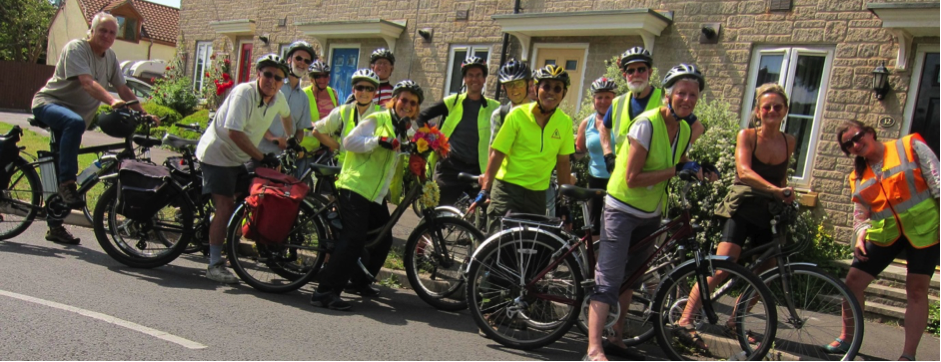
Life Cycle’s mission is to support more people to get cycling, by helping them overcome the barriers that prevent them. These barriers are typically fear of the roads, lack of knowledge about where to cycle, what kind of bike to buy and what accessories are needed. As a charity we are particularly interested in supporting those people who may face a number of other disadvantages that make it even harder for them to start cycling. For example they may have physical or mental health issues, be on very low incomes and live in places where there is no cycle storage. The community they live in may not have a positive attitude towards cycling, and a local culture that doesn’t encourage people to cycle.
At Life Cycle we have developed a number of services and projects designed to help people overcome these barriers and to enable them to take up, enjoy and benefit from cycling. We first developed our “Over 55’s” project in 2010 when our interest was sparked by a growing awareness of the ageing population and inactive lifestyles, and the impacts that this could have on people’s long term health outcomes. Research had shown that any amount of physical activity was better than none.
Older adults who continue to do any amount of exercise appear to live longer and have a lower risk of disability, stay independent and self-sufficient for longer and are less likely to feel lonely and isolated. (Stessman et al ‘Physical Activity, Function, and Longevity’, 2009)
At the same time, campaigners were highlighting issues of loneliness and isolation amongst older people and we felt this was something we could address through a “social cycling project”.
We wanted to develop a project that offered older people more than exercise, as to us the beauty of cycling is that offers so much more than just physical activity – it enables people to connect with others, nature and the environment around them, it offers people the chance to keep their brains active and to learn new skills and by joining the project is also gives people the chance to support their peers and give back. These elements are all identified by the New Economics Foundation in their “Five ways to wellbeing” as being key factors in maintaining a positive outlook and a sense of wellbeing.
In 2010 we ran a short pilot project over 5 months in two communities in Bristol to see if there was appetite for a larger programme and to assess whether a cycling project could deliver positive outcomes to participants. Our initial project was very low key and we rarely had more than three attendees on a ride, but the impact of the programme, was enough to convince us that the idea had legs and was worth pursuing.
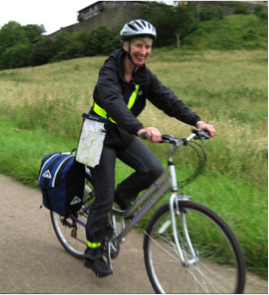
Happy rider!
I would like to say how very much I appreciate the lessons and rides organised for beginners and returners to cycling. As a returner after more than 30 years, they have been both very enjoyable and critical in gaining confidence to ride again.
It took a little while to scrabble together enough funding to offer any further rides, but in 2013 we received some funds from the Local Sustainable Transport Fund (LSTF) which enabled us to put on an extensive programme. We wanted to ensure that the offer to over 55’s would enable them to overcome the barriers that were preventing them from cycling and so the programme included:
- The chance to purchase an affordable quality refurbished bike
- cycle training to enable potential participants to gain the skills and confidence the need to join the ride programme;
- Route planning to help people find low trafficked and quite routes to their destinations.
- Maintenance sessions to give participants confidence fixing basic mechanical faults e.g. punctures.
- Taster sessions so that participants can meet ride leaders and volunteers in advance and put their minds at rest before launching into a ride.
- A programme of short, gentle rides, that use traffic free routes and cover a distance of around 10-12 miles, with a café break,
- A programme of longer rides that cover up to 30 miles over 5 or 6 hours again with a café stop.
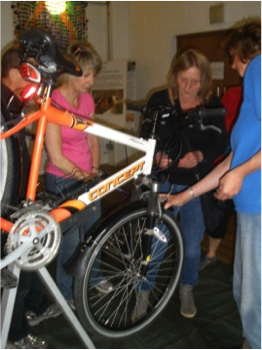
Bike Maintenance Session
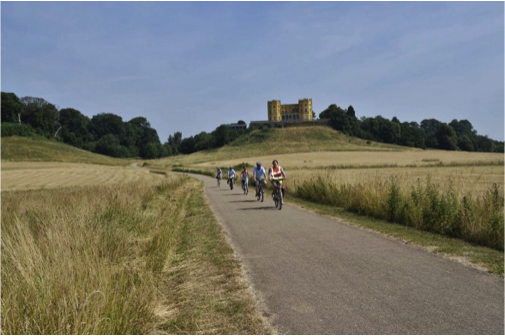
Beautiful traffic-free rides
We quickly realised that the social aspect of the rides is a very important to our participants and a café stop or picnic is a key motivating factor for many people.
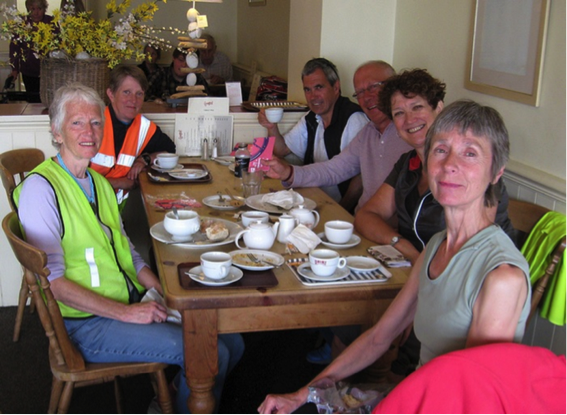
All important tea stop!
All our rides are led by a qualified Ride Leader, who risk assesses the routes beforehand, and a volunteer support to provide back-up should anything happen. Knowing there is a ride leader, who is familiar with the route, can sort our mechanical problems and deal with any issues that might arise, provides participants with peace of mind and this reassurance is what encourages many of them to join the project.
We have secured funding to enable us to continue running a programme of 40 rides per annum for the next three years, and have the interesting problem now of having too many participants, and actually needing to cap the rides at 15 people to ensure it is manageable. Our future plans involve encouraging more of our participants to become volunteers to supporting new riders to take part; and we hope this will give participants a sense of progression and achievement and the satisfaction of helping others.
The project is now extremely popular with over 55s. We receive overwhelmingly positive feedback from participants and a survey we undertook in 2014 showed that it had had a significant/ enormous impact on people’s physical and mental health, social connections, ability to connect with the environment and their cycling confidence.
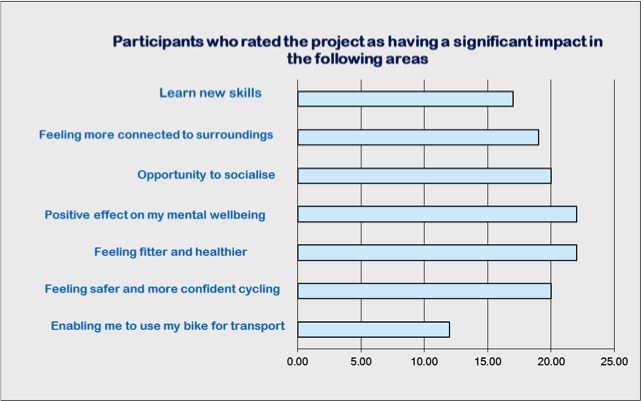
Perceived impact on participants
The final word goes to a couple of our participants:
I’ve suffered from depression and eating disorder for 18 years and tried everything to manage the condition. I’ve wanted to cycle for years but I was terrified. I then found Life Cycle UK, their groups, lessons and the refurbished bike scheme for people with mental illnesses… The impact cycling has made on my life is indescribable. It’s given me the chance to experience new parts of Bristol, see nature, appreciate the city I live in and have interaction with people. My fitness has greatly improved, my depression has lifted and I feel more clear headed, happy and free.
The Project (SCs) has been fantastic for me. It has got me back on my bike & I have regained my confidence through the Project. I like the fact that I have discovered new routes & I’m so much braver about tackling new roads on my own now. I even rode the St James’ Roundabout recently, something I would never have down prior to riding with Over 55’s.
Poppy Brett, CEO, Life Cycle UK, April 2016.
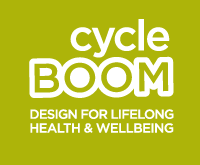
A 91 year old volunteer of the soccercclub svBabberich in the Netherlands cycles 20km twice a week from his homecity to the club. Thanks to the cycle infrastructure. For three years he did it safe on a normal bike but he fell a few times. Now he is little (but no to!) happy with his trike.
http://www.svbabberich.nl/default.aspx?page=newsdetails&newsID=4611